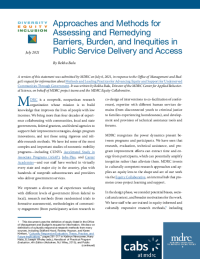Approaches and Methods for Assessing and Remedying Barriers, Burden, and Inequities in Public Service Delivery and Access

 A version of this statement was submitted by MDRC on July 6, 2021, in response to the Office of Management and Budget’s request for information about Methods and Leading Practices for Advancing Equity and Support for Underserved Communities Through Government. It was written by Rekha Balu, Director of the MDRC Center for Applied Behavioral Science, on behalf of MDRC project teams and the MDRC Equity Collaborative.
A version of this statement was submitted by MDRC on July 6, 2021, in response to the Office of Management and Budget’s request for information about Methods and Leading Practices for Advancing Equity and Support for Underserved Communities Through Government. It was written by Rekha Balu, Director of the MDRC Center for Applied Behavioral Science, on behalf of MDRC project teams and the MDRC Equity Collaborative.
MDRC is a nonprofit, nonpartisan research organization whose mission is to build knowledge that improves the lives of people with low incomes. We bring more than four decades of experience collaborating with communities, local and state governments, federal grantees, and federal agencies to support their improvement strategies, design program innovations, and test those using rigorous and reliable research methods. We have led some of the most complex and important studies of economic mobility programs—including CUNY’s Accelerated Study in Associate Programs (ASAP), Jobs-Plus, and Career Academies—and our staff have worked in virtually every state and major city in the country, plus with hundreds of nonprofit subcontractors and providers who deliver government services.
We represent a diverse set of experiences working with different levels of government (from federal to local), research methods (from randomized trials to formative assessments), methodologies of community engagement (from participatory action research to co-design of interventions to co-facilitation of conferences), expertise with different human services domains (from disconnected youth to criminal justice to families experiencing homelessness), and development and provision of technical assistance tools and forums.
MDRC recognizes the power dynamics present between programs and participants. We have seen that research, evaluation, technical assistance, and program improvement efforts can extract time and energy from participants, which can potentially amplify inequities rather than alleviate them. MDRC invests in culturally competent research approaches and applies an equity lens to the shape and arc of our work via the Equity Collaborative, an internal hub that promotes cross-project learning and support.
To implement optimal strategies for reducing overall burden, it will be critical for federal agencies to identify the full range of burdens that participants, staff, and administrators experience. Among the recommendations that are described in this paper:
- To build understanding of psychological costs, start by describing the context and design of a program or policy.
- To understand burdens facing participants and staff, quantify drop-off or attrition associated with implicit and explicit requirements and actions.
- Use indicators of inequity and analyses that capture different burdens and their consequences.
- Test interventions that reduce burdens by changing systems, rather than tweaking information-seeking in ways that still burden individuals or families. Examples include:
- Adopt presumptive or proactive eligibility for programs and services.
- Consolidate application systems.
- Reduce the intensity of requirements for people with multiple burdens.
- Remove small process requirements that impose financial strain.
- Use automatic or default enrollment in programs.
- Use personalized staff support to reduce multiple burdens for specific target populations.
- Reduce data collection and duplicative burdens for participants and program staff with efficient data linkages and use of administrative data.
We hope that the information in this response, which comes from our experience partnering with federal, state, and local agencies over the years, proves useful to the Office of Management and Budget in its quest to “identify effective methods for assessing whether federal agency policies and actions equitably serve all eligible individuals and communities, particularly those that are currently or historically underserved.”






